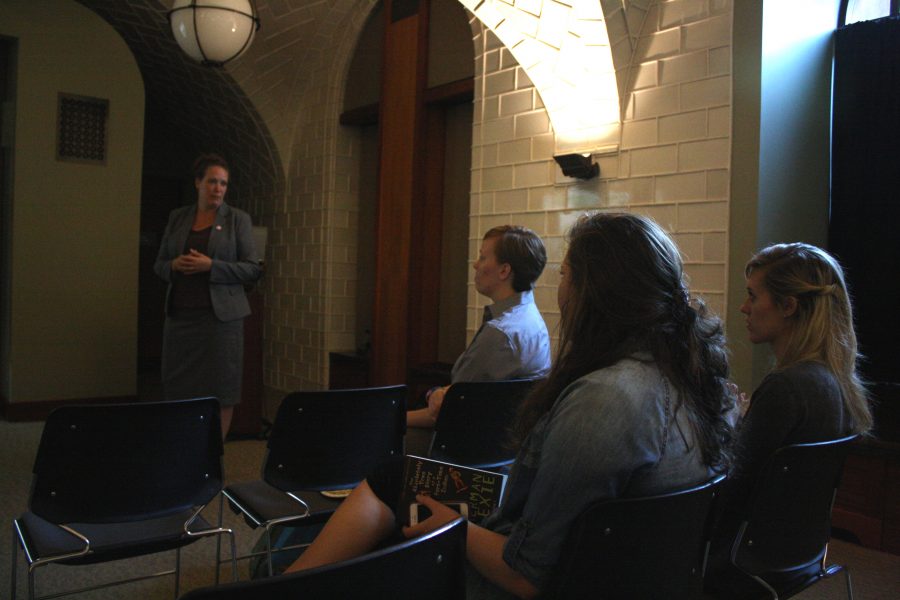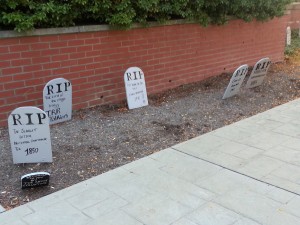Each year in America, books from across every genre are taken out of school curriculums and banned from the shelves of local libraries.
In an attempt to draw attention to this issue, the last week of September was declared “Banned Books Week” by library activist Judith Krug; a declaration that was sponsored by the American Library Association (ALA) and the Library of Congress, among others.
In response, the Chatham University Beyond the Page Book Club held an event to raise awareness about Banned Books Week, specifically in regards to the book, “The Absolute True Diary of a Part-Time Indian” by Sherman Alexie.
On Friday, September 26, Chatham students gathered in the Mellon Board Room to discuss the book and the implications of censorship in America.
Upon arrival attendees were encouraged to fill their plates with spinach and artichoke dip, along with the other foods available, and make their way over to the far end of the room where about 40 chairs were set up facing a projection screen on the back wall.
After everyone was seated Rachel Owen, the event organizer and President of the Beyond the Page Book Club went to the podium to say a few opening remarks.
She thanked everyone for coming and thanked all those who had contributed to the Banned Books Week event, including the Artist Collective’s efforts in creating the book graveyard and coffin at the Jenny King Mellon Library.
She then introduced the evening’s guest lecturer Dr. Holly Jones, University of Alabama in Huntsville professor and a specialist in ethnic American and contemporary literature, who was there to lead the discussion on the censorship of Alexie’s book.
Jones began her discussion by elaborating on the context under which Alexie’s book was being studied. She said that “The Absolute True Diary of a Part-Time Indian” was in the ALA’s top 10 most frequently challenged books, due to sexuality, language, and anti-Christian themes.
Jones said that this was especially troubling when one considered that the authors most often being banned are minority authors, with books that represents minority perspectives. She cited several parents who spoke out against the book being taught in their children’s schools, and she noted that people often feel uncomfortable with these themes but “feeling…uncomfortable can be necessary for intellectual growth”
She then went on to look at the novel itself and specifically how Alexie chose to use the term “Indian.”
According to Jones, “Indian provides a shared identity for colonized people. Alexie uses Indian to speak for/speak to the identities and experiences of those people.”
She also explained how in the novel, it is a word that means different things to different people. To people on the reservation “Indian” means being poor, being bound to the reservation, and being witness to increasing intolerance. But it also meant being playful with language, family oriented, humorous in the face of tragedy, and open to the supernatural. To white people, however, being Indian means being potentially violent, inured to pain, drunk, a recipient of government handouts, attractively outcast, an undeserving of opportunities.
This conflict of identity played a large role in the book when Junior, the main character, left the reservation to go to a white school. Jones said that the anger that his friends felt, and that he felt throughout this process lead to many scenes that could have potentially been considered inappropriate by an audience who did not understand the context.
On the topic of Native American authorship in general, Jones said, “Native American’s have tended to be the objects, rather than the authors, of American literature.” She said that this is a problem because “Native Americans write and read from a different subject position than their white American counterparts.”
Jones then went on to discuss the history of Native Americans’ struggles with the United States government. Before doing so, however, she asked the people in the room if everyone already knew the things that she would be going over, and no one raised their hands, which served to demonstrate Jones’s point about perspective and understanding.
Towards the end of the presentation Jones posed the question, “Does removing controversial text’s ‘white wash’ history?” The question was rhetorical, but extremely thought provoking.
After the conclusion of the lecture Jone’s was met with enthusiastic applause from the approximately 20 people in the audience.
In regards to her choice of books for this years Banned Books events, Owens said, “I selected this novel because it has been frequently banned. It’s speaking to the Native American experience, which has often been silenced and marginalized. I find that very troubling and wanted to bring attention to it.”
She said that she found Jones through some research she did into academic papers surrounding the book, and made contact through the Book Club faculty advisor, Dr. Bruckner.
“Overall I think the event went really well,” Owen said. “Dr. Jones was fantastic.”
Owen also said that several people approached her about the Artist Collective’s work in library, and about Banned Books week in general, so she felt that it succeeded in raising awareness for the many books and authors who have experienced censorship.



